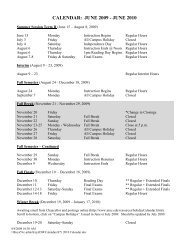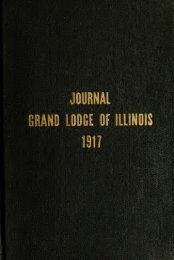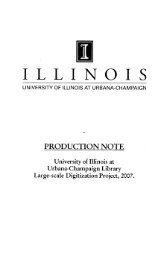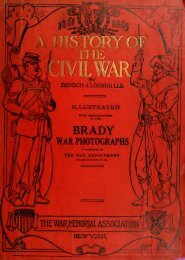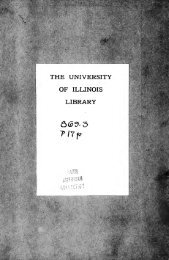The House of Morrell; with a foreword by William ... - University Library
The House of Morrell; with a foreword by William ... - University Library
The House of Morrell; with a foreword by William ... - University Library
Create successful ePaper yourself
Turn your PDF publications into a flip-book with our unique Google optimized e-Paper software.
!<br />
production, except that it stinted t;iitluT c;ist aiui fiuicci up hirther west,<br />
at St. Joseph, Mo.<br />
<strong>The</strong>re is no need Id tell here the part that the development ot (lie livestock<br />
industry played in tiie winning <strong>of</strong> the west. That story has been told<br />
many, many times, in fact and fiction, on the artist's canvas and on the<br />
silver screen. But it might be well to sum up the picture in the words <strong>of</strong> a<br />
writer on the western scene as he says: "<strong>The</strong> story <strong>of</strong> America's cattle<br />
trade is one <strong>of</strong> the most romantic tales <strong>of</strong> modern times. In its swing and<br />
its dignity, it truly is a saga. This story deals <strong>with</strong> more than mere meat,<br />
hides ami tallow; for its cogent, salient chapters have as much to do <strong>with</strong><br />
men and their achievements as <strong>with</strong> animals and their products. It is concerned<br />
as much <strong>with</strong> the cowboy as it is <strong>with</strong> beefsteak. It begins <strong>by</strong> reciting<br />
the doings <strong>of</strong> a Spanish knight in armor. It continues <strong>with</strong> accounts <strong>of</strong><br />
Indian conflicts, <strong>of</strong> range wars, <strong>of</strong> bravery and <strong>of</strong> cowardice, <strong>of</strong> heroic<br />
generosity, <strong>of</strong> sordid thievery, <strong>of</strong> gentleness, murder and sudden death,<br />
<strong>of</strong> the thousand and one things that happened upon America's frontier<br />
and in the lonely wastes beyond. It tells <strong>of</strong> men who, raising livestock, not<br />
only provided foodstuffs for a nation but also shaped materially that nation's<br />
social and political thought."<br />
It was during the second period in the story <strong>of</strong> meat that Cincinnati<br />
became known as "Porkopolis," a city that had "perfected the system<br />
which packs lifteen bushels <strong>of</strong> corn into a pig and packs that pig into a<br />
barrel and sends him over the mountains and over the ocean to feed mankind."<br />
At that time Cincinnati was the center <strong>of</strong> the area west <strong>of</strong> the Alleghenies<br />
and east <strong>of</strong> the Mississippi river. This area produced great quantities<br />
<strong>of</strong> corn and feeding that corn to hogs became a major industry. Cincinnati<br />
was accessible to these interests and was easily in reach <strong>of</strong> markets<br />
to the east and to the south. Railroads came to Cincinnati at this time,<br />
too. And <strong>with</strong> the Ohio river giving her access to the Mississippi and the<br />
south, transportation no longer <strong>of</strong>fered any difficulties. Cincinnati did its<br />
share in making meat packing the industry it is today<br />
But Cincinnati's place in the picture was to dim as the great corn producing<br />
areas <strong>of</strong> Illinois and Iowa were opened; as the railroads reached<br />
farther and farther west; and as the people inhabiting these areas began<br />
to demand a more convenient market. <strong>The</strong> factor clinching the meat packing<br />
industry for Chicago was the Civil War. Chicago, far distant from<br />
the scenes <strong>of</strong> major battles, moved into the picture easily, eagerly. Everyone,<br />
producers, commission merchants and manufacturers, moved in and<br />
produced the huge quantities <strong>of</strong> meat desired <strong>by</strong> the Union army. <strong>The</strong>y<br />
produced in such large quantity that Chicago took over the major share<br />
<strong>of</strong> the meat producing business, and still maintains a large portion <strong>of</strong> it<br />
today.<br />
Meat's third period may be saitl to have started in i860 when the war<br />
26





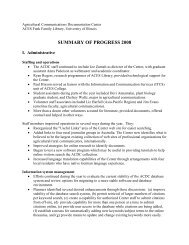
![La musa galante [microform] - University Library](https://img.yumpu.com/50760818/1/190x222/la-musa-galante-microform-university-library.jpg?quality=85)
